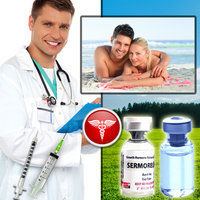Introduction
Testosterone, a pivotal hormone in the male body, plays a crucial role in muscle development, bone density, and overall physical performance. In recent years, testosterone replacement therapy (TRT) has gained attention not only for its medical applications but also for its potential to enhance athletic performance among American men. This article delves into the sports medicine perspective on TRT, exploring its effects, benefits, and considerations for athletes.
Understanding Testosterone Replacement Therapy
Testosterone replacement therapy is a medical treatment designed to restore normal testosterone levels in men who suffer from hypogonadism, a condition characterized by the body's inability to produce sufficient testosterone. TRT can be administered through various methods, including injections, gels, patches, and pellets, each with its own set of advantages and considerations.
The Link Between Testosterone and Athletic Performance
Testosterone is known to influence several aspects of athletic performance, including muscle mass, strength, and endurance. Higher levels of testosterone can lead to increased protein synthesis, which is essential for muscle growth and repair. Additionally, testosterone can enhance red blood cell production, improving oxygen delivery to muscles and potentially boosting endurance.
Sports Medicine Perspective on TRT
From a sports medicine standpoint, the use of TRT in athletes is a contentious issue. While TRT can be beneficial for men with clinically diagnosed hypogonadism, its use in athletes without a medical need raises ethical and regulatory concerns. The World Anti-Doping Agency (WADA) has strict guidelines on testosterone levels, and athletes found to have levels exceeding these limits may face sanctions.
Benefits of TRT for Athletes with Hypogonadism
For athletes diagnosed with hypogonadism, TRT can be a game-changer. Studies have shown that TRT can significantly improve muscle mass, strength, and overall physical performance in these individuals. A study published in the *Journal of Clinical Endocrinology & Metabolism* found that men with hypogonadism who underwent TRT experienced notable improvements in muscle strength and endurance, enabling them to perform better in their respective sports.
Potential Risks and Side Effects
While TRT can offer significant benefits, it is not without risks. Potential side effects include acne, sleep apnea, and an increased risk of cardiovascular disease. Moreover, improper use of TRT, such as using it without a medical need or in excessive doses, can lead to hormonal imbalances and other health issues. It is crucial for athletes considering TRT to consult with a healthcare provider to weigh the potential benefits against the risks.
Regulatory and Ethical Considerations
The use of TRT in sports is heavily regulated, with organizations like WADA setting strict testosterone thresholds. Athletes must adhere to these regulations to avoid penalties, which can include suspension or disqualification. Ethically, the use of TRT to gain a competitive edge in the absence of a medical need is widely debated, with many arguing that it undermines the spirit of fair play.
Conclusion
Testosterone replacement therapy holds significant promise for enhancing athletic performance in American men with hypogonadism. However, its use must be carefully managed to ensure safety and compliance with sports regulations. Athletes considering TRT should engage in thorough discussions with healthcare professionals to understand the potential benefits and risks. As the field of sports medicine continues to evolve, ongoing research will further illuminate the role of TRT in athletic performance, guiding future policies and practices.
In summary, while TRT can be a powerful tool for athletes with specific medical conditions, its broader application in sports remains a complex and contentious issue that requires careful consideration and regulation.
Contact Us For A Fast And Professional Response

- 0001) TRT's Impact on Mental Health in American Men: Benefits, Risks, and Holistic Approaches [Last Updated On: March 12th, 2025] [Originally Added On: March 12th, 2025]
- 0002) Testosterone Replacement Therapy: Benefits and Risks for Young American Men with Hypogonadism [Last Updated On: March 18th, 2025] [Originally Added On: March 18th, 2025]
- 0003) Optimizing Testosterone Replacement Therapy with Diet and Exercise: A Holistic Approach for American Men [Last Updated On: March 18th, 2025] [Originally Added On: March 18th, 2025]
- 0004) TRT Boosts Bone Health in American Males: Benefits and Considerations [Last Updated On: March 18th, 2025] [Originally Added On: March 18th, 2025]
- 0005) American Men's Experiences with Testosterone Replacement Therapy: Impacts and Insights [Last Updated On: March 18th, 2025] [Originally Added On: March 18th, 2025]
- 0006) Navigating Insurance Coverage for Testosterone Replacement Therapy: A Comprehensive Guide [Last Updated On: March 19th, 2025] [Originally Added On: March 19th, 2025]
- 0007) Testosterone Replacement Therapy: Dosage, Methods, and Risks for American Males [Last Updated On: March 19th, 2025] [Originally Added On: March 19th, 2025]
- 0008) Testosterone Replacement Therapy: Enhancing Male Health and Vitality in American Men [Last Updated On: March 19th, 2025] [Originally Added On: March 19th, 2025]
- 0009) TRT: Benefits, Risks, and Prostate Health Monitoring in American Men [Last Updated On: March 19th, 2025] [Originally Added On: March 19th, 2025]
- 0010) Future of TRT: Innovations, Personalization, and Accessibility in American Medicine [Last Updated On: March 20th, 2025] [Originally Added On: March 20th, 2025]
- 0011) Economic Impact of Testosterone Replacement Therapy on U.S. Healthcare System [Last Updated On: March 20th, 2025] [Originally Added On: March 20th, 2025]
- 0012) TRT and Holistic Health: Enhancing American Men's Wellness with Alternative Therapies [Last Updated On: March 21st, 2025] [Originally Added On: March 21st, 2025]
- 0013) TRT in American Men: Masculinity, Stigma, and Healthcare Dynamics [Last Updated On: March 21st, 2025] [Originally Added On: March 21st, 2025]
- 0014) TRT Enhances Sleep Quality in American Males with Low Testosterone [Last Updated On: March 21st, 2025] [Originally Added On: March 21st, 2025]
- 0015) Testosterone Replacement Therapy: Enhancing Mood in American Males [Last Updated On: March 22nd, 2025] [Originally Added On: March 22nd, 2025]
- 0016) TRT: Enhancing Weight Management in American Males Through Holistic Approach [Last Updated On: March 22nd, 2025] [Originally Added On: March 22nd, 2025]
- 0017) Hypogonadism and TRT: Benefits, Risks, and Lifestyle Impact on American Males [Last Updated On: March 23rd, 2025] [Originally Added On: March 23rd, 2025]
- 0018) TRT's Impact on Immune Function in American Men: Benefits and Risks [Last Updated On: March 23rd, 2025] [Originally Added On: March 23rd, 2025]
- 0019) TRT's Role in Managing Diabetes: Insights for American Men [Last Updated On: March 23rd, 2025] [Originally Added On: March 23rd, 2025]
- 0020) TRT Benefits for American Males: Enhancing Skin Health and Elasticity [Last Updated On: March 23rd, 2025] [Originally Added On: March 23rd, 2025]
- 0021) Managing Side Effects of Testosterone Replacement Therapy in American Males [Last Updated On: March 24th, 2025] [Originally Added On: March 24th, 2025]
- 0022) Testosterone Replacement Therapy: Benefits, Risks, and Management for Aging Males [Last Updated On: March 24th, 2025] [Originally Added On: March 24th, 2025]
- 0023) Testosterone Replacement Therapy: Enhancing Muscle Mass in American Men [Last Updated On: March 24th, 2025] [Originally Added On: March 24th, 2025]
- 0024) TRT's Potential to Enhance Cognitive Function in American Men: An Overview [Last Updated On: March 24th, 2025] [Originally Added On: March 24th, 2025]
- 0025) TRT: Benefits for American Males and Its Impact on Vision Health [Last Updated On: March 24th, 2025] [Originally Added On: March 24th, 2025]
- 0026) Testosterone Replacement Therapy: Monitoring, Adjusting, and Lifestyle for American Males [Last Updated On: March 24th, 2025] [Originally Added On: March 24th, 2025]
- 0027) Testosterone Replacement Therapy: Combating Fatigue in American Men [Last Updated On: March 24th, 2025] [Originally Added On: March 24th, 2025]
- 0028) TRT: Enhancing Emotional Well-being in American Men with Low Testosterone [Last Updated On: March 24th, 2025] [Originally Added On: March 24th, 2025]
- 0029) TRT's Impact on Cardiovascular Health in American Men: Benefits and Risks [Last Updated On: March 24th, 2025] [Originally Added On: March 24th, 2025]
- 0030) TRT's Impact on Male Fertility: Risks, Strategies, and Lifestyle Considerations [Last Updated On: March 24th, 2025] [Originally Added On: March 24th, 2025]
- 0031) TRT and Hair Loss: Understanding Risks and Management Strategies for American Men [Last Updated On: March 25th, 2025] [Originally Added On: March 25th, 2025]
- 0032) TRT's Impact on Digestive Health in American Men: A Comprehensive Overview [Last Updated On: March 25th, 2025] [Originally Added On: March 25th, 2025]
- 0033) TRT Benefits for Joint Health in American Males: A Comprehensive Overview [Last Updated On: March 25th, 2025] [Originally Added On: March 25th, 2025]
- 0034) TRT Enhances Injury Recovery in American Males: Benefits and Considerations [Last Updated On: March 25th, 2025] [Originally Added On: March 25th, 2025]
- 0035) Testosterone Replacement Therapy: Benefits, Risks, and Management for American Men [Last Updated On: March 25th, 2025] [Originally Added On: March 25th, 2025]
- 0036) TRT Enhances Cognitive Function and Mental Clarity in American Men [Last Updated On: March 26th, 2025] [Originally Added On: March 26th, 2025]
- 0037) TRT: A Promising Approach to Managing Chronic Pain in American Males [Last Updated On: March 26th, 2025] [Originally Added On: March 26th, 2025]
- 0038) Testosterone Replacement Therapy: Benefits, Risks, and Latest Research for American Men [Last Updated On: March 26th, 2025] [Originally Added On: March 26th, 2025]
- 0039) Testosterone Replacement Therapy: Benefits, Risks, and Management for American Men [Last Updated On: March 26th, 2025] [Originally Added On: March 26th, 2025]
- 0040) Testosterone Replacement Therapy: Enhancing Stamina in American Males [Last Updated On: March 26th, 2025] [Originally Added On: March 26th, 2025]
- 0041) TRT's Impact on Liver Health: Monitoring and Managing Risks [Last Updated On: March 26th, 2025] [Originally Added On: March 26th, 2025]
- 0042) Testosterone Replacement Therapy: Costs, Benefits, and Accessibility for American Men [Last Updated On: March 27th, 2025] [Originally Added On: March 27th, 2025]
- 0043) Testosterone Replacement Therapy: A Promising Treatment for Depression in American Males [Last Updated On: March 27th, 2025] [Originally Added On: March 27th, 2025]
- 0044) TRT's Potential Benefits for Respiratory Health in American Men: A Comprehensive Overview [Last Updated On: March 27th, 2025] [Originally Added On: March 27th, 2025]
- 0045) TRT: A Solution for Low Libido in American Males - Benefits, Safety, and Future [Last Updated On: March 27th, 2025] [Originally Added On: March 27th, 2025]
- 0046) TRT and Blood Pressure: Monitoring and Management Strategies for American Men [Last Updated On: March 28th, 2025] [Originally Added On: March 28th, 2025]
- 0047) Maximizing TRT Benefits: Diet, Exercise, Sleep, and Stress Management for American Males [Last Updated On: March 29th, 2025] [Originally Added On: March 29th, 2025]
- 0048) TRT: Managing Stress and Enhancing Well-being in American Males [Last Updated On: March 29th, 2025] [Originally Added On: March 29th, 2025]
- 0049) TRT's Impact on Kidney Function: Benefits and Risks for American Males [Last Updated On: March 29th, 2025] [Originally Added On: March 29th, 2025]
- 0050) Testosterone Replacement Therapy: Enhancing Confidence and Well-being in American Males [Last Updated On: March 30th, 2025] [Originally Added On: March 30th, 2025]
- 0051) Choosing the Right TRT Clinic: Key Factors for American Males [Last Updated On: March 30th, 2025] [Originally Added On: March 30th, 2025]
- 0052) Testosterone Replacement Therapy: Side Effects and Risks for American Men [Last Updated On: March 31st, 2025] [Originally Added On: March 31st, 2025]
- 0053) TRT's Complex Effects on Blood Sugar in American Men: A Comprehensive Analysis [Last Updated On: April 1st, 2025] [Originally Added On: April 1st, 2025]
- 0054) TRT's Impact on Cholesterol: Insights for American Males on Therapy [Last Updated On: April 1st, 2025] [Originally Added On: April 1st, 2025]
- 0055) TRT's Impact on Thyroid Function: Essential Insights for American Men [Last Updated On: April 4th, 2025] [Originally Added On: April 4th, 2025]
- 0056) Testosterone Replacement Therapy: Enhancing Health and Vitality in American Males [Last Updated On: April 5th, 2025] [Originally Added On: April 5th, 2025]
- 0057) Exploring TRT: Benefits, Risks, and Ethics for American Male Athletes [Last Updated On: April 8th, 2025] [Originally Added On: April 8th, 2025]
- 0058) Maximizing Health: Integrating TRT with Lifestyle and Pharmacological Therapies for American Males [Last Updated On: April 8th, 2025] [Originally Added On: April 8th, 2025]
- 0059) Understanding Allergic Reactions in Testosterone Replacement Therapy: Risks and Management [Last Updated On: April 9th, 2025] [Originally Added On: April 9th, 2025]
- 0060) TRT's Impact on Dental Health: Insights for American Men [Last Updated On: April 9th, 2025] [Originally Added On: April 9th, 2025]
- 0061) TRT and Hearing Health: Considerations for American Males [Last Updated On: April 9th, 2025] [Originally Added On: April 9th, 2025]
- 0062) TRT: Boosting Social Confidence and Relationships in American Males [Last Updated On: April 9th, 2025] [Originally Added On: April 9th, 2025]
- 0063) Understanding Testosterone Replacement Therapy: Interpreting Lab Results for American Men [Last Updated On: April 10th, 2025] [Originally Added On: April 10th, 2025]
- 0064) Traveling with Testosterone Replacement Therapy: A Comprehensive Guide for American Men [Last Updated On: April 10th, 2025] [Originally Added On: April 10th, 2025]
- 0065) TRT Benefits for American Men: Enhancing Nail Health and Overall Vitality [Last Updated On: April 10th, 2025] [Originally Added On: April 10th, 2025]
- 0066) TRT Benefits for Eye Health in American Men: Dry Eye, AMD, and More [Last Updated On: April 11th, 2025] [Originally Added On: April 11th, 2025]
- 0067) Legal Framework and Considerations for Testosterone Replacement Therapy in the U.S. [Last Updated On: April 12th, 2025] [Originally Added On: April 12th, 2025]
- 0068) TRT's Impact on American Men's Reproductive Health: Fertility and Sperm Production Effects [Last Updated On: April 12th, 2025] [Originally Added On: April 12th, 2025]
- 0069) Testosterone Replacement Therapy: Social Implications for American Males [Last Updated On: April 16th, 2025] [Originally Added On: April 16th, 2025]
- 0070) TRT's Impact on Chest Health: Benefits, Risks, and Management in American Men [Last Updated On: April 16th, 2025] [Originally Added On: April 16th, 2025]
- 0071) Testosterone Replacement Therapy: Psychological Impacts and Support for American Men [Last Updated On: April 16th, 2025] [Originally Added On: April 16th, 2025]
- 0072) TRT's Impact on Neck Health: Benefits and Risks for American Men [Last Updated On: April 17th, 2025] [Originally Added On: April 17th, 2025]
- 0073) TRT's Impact on Cognitive Function and Artistic Expression in American Males [Last Updated On: April 17th, 2025] [Originally Added On: April 17th, 2025]
- 0074) TRT Enhances Foot Health in American Males: Muscle, Bone, and Nerve Benefits [Last Updated On: April 17th, 2025] [Originally Added On: April 17th, 2025]
- 0075) TRT's Impact on Hand Health: Benefits, Risks, and Management for American Men [Last Updated On: April 18th, 2025] [Originally Added On: April 18th, 2025]
- 0076) Ethical Challenges in Testosterone Replacement Therapy: Consent, Access, and Misuse [Last Updated On: April 18th, 2025] [Originally Added On: April 18th, 2025]
- 0077) TRT: Boosting Work Performance in American Males with Low Testosterone [Last Updated On: April 18th, 2025] [Originally Added On: April 18th, 2025]
- 0078) TRT: Enhancing Back Health in American Males Through Testosterone Therapy [Last Updated On: April 20th, 2025] [Originally Added On: April 20th, 2025]
- 0079) Testosterone Replacement Therapy: Health Benefits vs. Environmental Impact in the U.S. [Last Updated On: April 21st, 2025] [Originally Added On: April 21st, 2025]
- 0080) TRT's Impact on Abdominal Health: Benefits, Risks, and Considerations for American Men [Last Updated On: April 22nd, 2025] [Originally Added On: April 22nd, 2025]
















